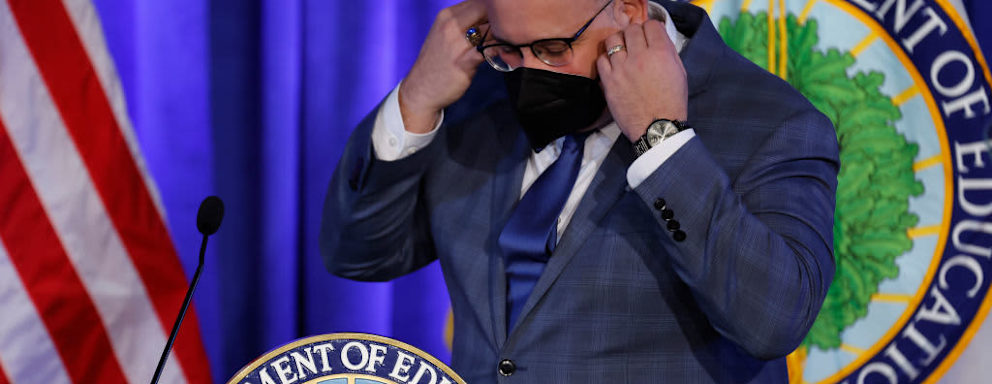Biden Admin. to Hold Executives of <q>Risky</q> Colleges Accountable
 Credit: Image Credit: Chip Somodevilla/Staff / Getty Images News
Credit: Image Credit: Chip Somodevilla/Staff / Getty Images News- The Biden administration continues its crackdown on
risky
college programs, this time by holding college owners responsible. - Only high-ranking executives from the
riskiest institutions
will be in the Department of Education’s crosshairs. - Previously, executives from shady institutions could walk away without consequences, even after engaging in fraudulent practices.
College CEOs and owners may soon be forced to pay up if the Department of Education (ED) finds they defrauded students at their institution.
ED announced that it is implementing rules to hold individuals — not just the institution or owning corporation — responsible for paying the department back in certain circumstances. This is the latest in a long line of actions President Joe Biden has taken to increase oversight and accountability of risky
college programs.
The change would only impact institutions that receive federal funds or distribute federal financial aid to students.
Individuals who control schools and reap substantial profits are responsible for running healthy institutions,
Federal Student Aid COO Richard Cordray said in a statement. When financially risky schools jeopardize the safety of the government’s Title IV funds and take advantage of students, we intend to hold those individuals accountable.
When Will Leaders Be Held Liable?
Federal Student Aid (FSA) lays out in its announcement the boxes that need to be checked for ED to pursue personal liability.
First, ED may only pursue recoupment from people with a substantial ownership interest
in the institution. That includes executives or members of the board of directors who cosign the Program Participation Agreement (PPA) the school must submit to receive federal funds.
Additionally, the guidance states the department would not impose this requirement if it has not reprimanded an institution in the past five years.
This likely prevents ED from pursuing recoupment for long-dormant cases.
Lastly, ED laid out a list of factors that could lead it to implement this new liability rule. Some of those include when an institution:
- Receives a significant amount of federal funding
- Has had a large number of borrower defense claims filed against it
- Has civil or criminal lawsuits involving claims of
dishonesty, fraud, misrepresentation, consumer harm, or financial malfeasance
- Fails to meet for-profit legal requirements like the 90/10 rule
- Is considered financially unstable
- Has had its accrediting agency take action against it
ED added that it will focus on just the riskiest
institutions on a case-by-case basis.
The ED will decide whether to pursue personal liability when an institution’s program participation agreement is up for renewal or if the school changes ownership.
A Dormant Power Being Put to Use
This action from ED is something accountability advocates have longed for.
In 2019, a coalition of four U.S. senators questioned why executives from the then-defunct Corinthian Colleges did not face harsher penalties despite the Securities and Exchange Commission (SEC) finding they engaged in fraudulent practices. The SEC fined former CEO Jack Massimino and former CFO Robert Owen $80,000 and $20,000, respectively.
In the three years before Corinthian’s collapse, Massimino and Owen received $9.6 million and $2.3 million in total compensation, respectively.
The department announced in June that it canceled $5.8 billion in federal student loan debt belonging to former Corinthian Colleges students.
ED never sought recoupment from executives following the system’s closure.
The department similarly canceled $3.9 billion in federal student loan debt for former ITT Technical Institute students. Former CEO Kevin Modany signed a settlement agreement with the SEC, agreeing to pay $200,000 and a ban on serving as an executive for any public company.
Again, while Mondany settled with the SEC, ED never sought recoupment.
The department has only recently begun holding corporations accountable for discharged federal student loans. In February 2022, ED ordered DeVry University to pay back nearly $24 million for approved borrower defense claims, and DeVry answered with a lawsuit aiming to block this action in October.